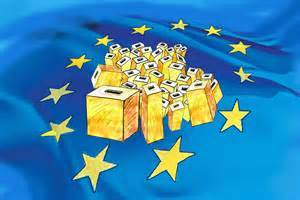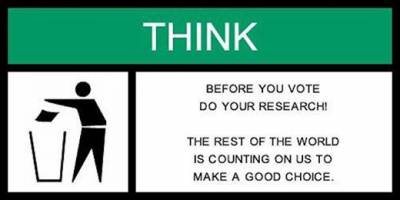 This week there are elections in all member states of the European Union for the new parliament. Never was a campaign so empty and dominated by blaming the EU. How come? And is the blame justified?
This week there are elections in all member states of the European Union for the new parliament. Never was a campaign so empty and dominated by blaming the EU. How come? And is the blame justified?
When the EU was founded it was a visionary project: creating a union between the countries that had been in war with each other not so long ago. The idea was to tie those countries together so that a new war becomes less likely. At the heart of the union was always the single market: getting rid of national boarders and regulation that hinder the free movement of people, goods and capital. This helped countries to prosper and brought them on the same time closer together.
Two generations later most boarder controls within the union are history and more and more countries even use the same currency, proving the self proclaimed experts wrong that claimed that this can never work. The union expanded in tasks as well - to areas where it is beneficial to have common policies or a common stance in this globalized world. At the same time people got used to the benefits of the EU and don't see those anymore as related to the union. Now it is as it happens sometimes in a long relationship: the goods things are taken for granted or are not seen anymore. But the lesser or negative sides come into focus and cling. Currently the EU has the worst reputation it had in history.
This development had been helped a hand by two things: lack of communication skills in the EU administration and national politicians using the EU as scapegoat.
The EU has never learned to communicate properly. Official communication - if there is any - is written from the perspective of the EU administration and does not take into account the receiver. Therefore it often misses the point - what is the benefit of the new regulation for the people in their daily life? Furthermore, the EU is not good at claiming success. Take a recent example: roaming fees. Currently you see all providers advertising how far they've dropped their charges. For a consumer it looks like as this is the result of competition and something initiated by the providers. Only few will know that the providers long fought against this and that the recent drop in charges is only thanks to the EU. The lack of good communication skills made it also easier for the yellow papers to come up with horror stories about EU regulations, often nonsense but always sticky. Who hasn't heard about the story of the cucumbers or does not think that the EU is to blame for conventional light bulbs being outlawed?
An even bigger reason for the bad standing of the EU are national politicians that use the EU as scapegoat. Most EU policies are based on initiatives from member states, they aren't made up in Brussels, but come from national governments. Sometimes because national politicians genuinely think that this should be regulated EU wide, sometimes because they think that this is beneficial for their country - or the next elections - and sometimes because they face nationally resistance and can't get it through their national legislation. If the resulting regulation is perceived positive at home, they are the first to claim the success. But if not - than they are in the front row to blame the EU for this. Or when the tie changes - e.g. the 3% norm for the budget deficit. Initiated by the Dutch and also claimed often by national politicians - but only till the Dutch budget deficit came below the threshold. Today the blame is all on Brussels. It is now an easy excuse for budget cuts: no, we really don't won't to cut those budgets, but you know - we have to, Brussels forces us. Yeah, right.
With this attitude the very same politicians maneuvered themselves in a tricky situation. Nowadays more and more countries have national populist movements, banking on the anti-EU mood created by opportunistic politicians. While actually supporting the EU but also happy to blame the EU for everything that goes wrong they are now forced by the populist parties to take a stance.
Well - at least they should. But they still don't dare to.
The campaigns for the current elections are mostly non-existent, empty (in the Netherlands several parties don't even take the effort to put a slogan on their posters - the name of the party must apparently be the motivation to vote for them...) or is trying to bank on the negative mood by being anti-EU.

This election will probably result in the biggest anti-EU vote ever. Voters are not stupid, they can see through fake anti-EU campaigns. The choice then is either one of the few pro-EU parties or a populist party - or to stay at home. Therefore, in the few countries that already have strong anti-EU movements this limited choice will be reflected in the vote.
At the end this will not result in an alarmingly high number of anti-EU seats. But is to hope that this will finally be a wake-up call for politicians. It is about time to tell the true story. And to take the EU project serious again. Otherwise it will be a question of time that even a breakup looks not unrealistic anymore.
Explain the EU, say goodbye to your scapegoat and start to be honest about decisions taken in Brussels - and engage finally the people! It was never so easy to engage people, especially with the modern means of communication. And - what is wrong with giving people also a direct say, e.g. via referendums? Be bold if you want to make sure that the EU is there to stay!